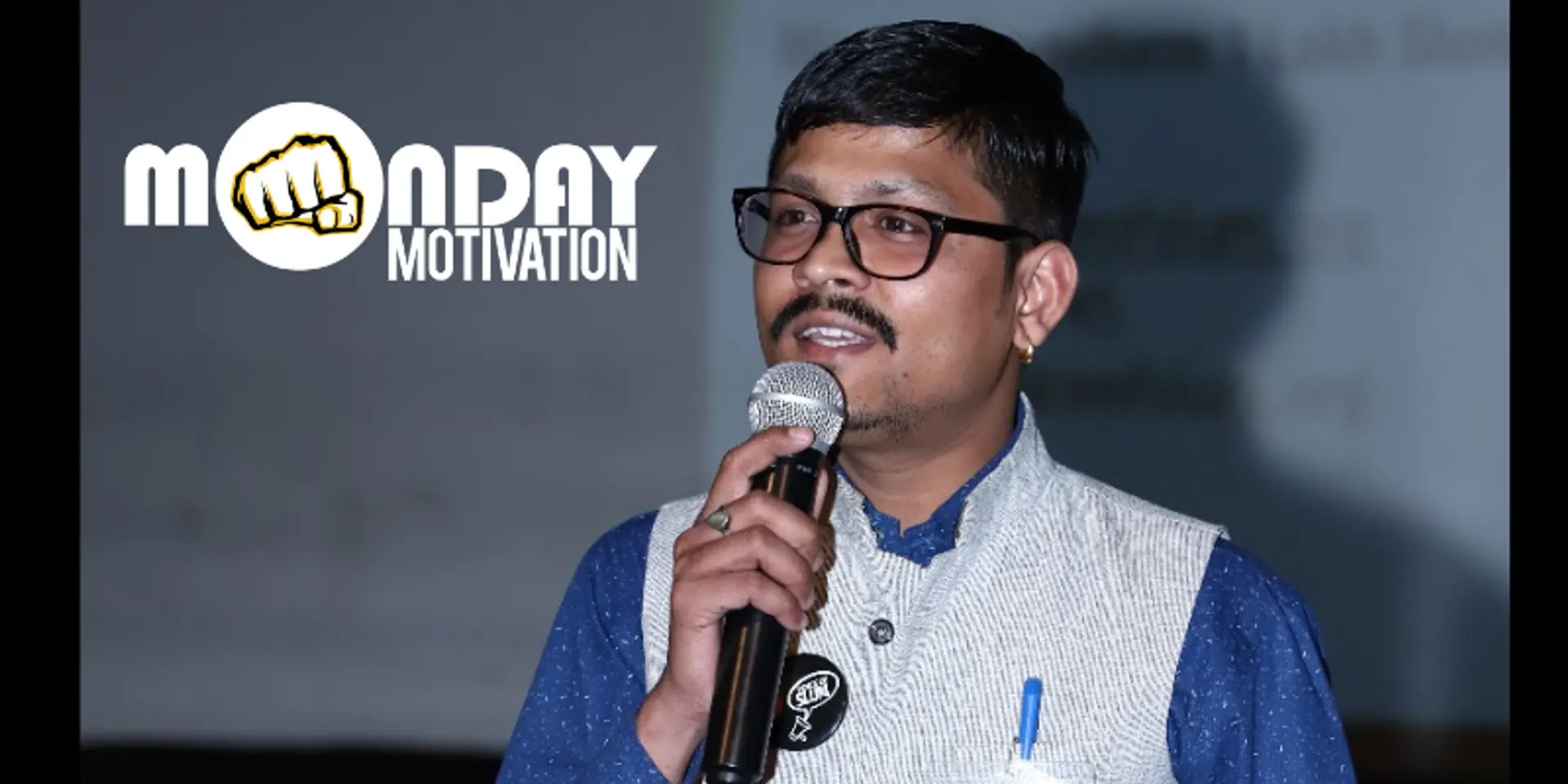Meet the former ragpicker who is now educating over 500 children
Dev Pratap Singh co-founded ‘Voice of Slum’ with Chandni Khan, an NGO now educating over 500 children. It also distributed over 20 lakh meals during the pandemic.
Dev Pratap Singh was born into a middle-class family in the Chambhal Sambhag area of Madhya Pradesh. His father worked in LIC of India, while his mother was a homemaker.
As a child, Dev was negatively impacted by miscreants famous in his area and wanted to be like them.
“At a very young age, they were my idols. I was very scared of my father as he was strict and we got into many rifts at home. So, I left the place at the age of 12 with just Rs 130 in my hand and took a train to Dabra, Gwalior,” Dev tells SocialStory.
The amount sufficed good meals and even some Coca-Cola for about 2.5 days. But after that, he didn’t have money for any more food or water.
Moreover, he didn’t want to go to any relative fearing consequences from his father. At that age, nobody was ready to give him a job either.

Dev Pratap Singh
At the city’s railway station, he came across kids his age cleaning garbage, segregating them, and earning money. He too joined them and began working as a ragpicker. To deal with the horrible smell of garbage, Dev like many other children got caught up in the ‘whitener’ addiction.
But because of insufficient money to fuel his addiction, Dev was drawn to petty thefts and found himself in jail for 15 days.
A stranger bailed him and the other children, and helped Dev get a job as a waiter at a dhaba located near a corporate office, where he had to make tea and serve them. Soon, he became friendly with the customers from the corporate, who would also transliterate English phrases to Hindi for him to learn.
“I wanted to become a waiter at that point and soon moved to Goa to find a job there,” he says.
After roaming the streets of Calangute, Goa, he found a job at a beach shack that gave him a salary of Rs 4,000 a month.
The turning point
A few years later, Dev moved to Delhi to work in a sales job, going from place to place. Within two years, he was promoted to area sales manager and was earning Rs 45,000.
Then, in 2012, he met his mother in Agra after many years, a really emotional moment for the duo. “Unfortunately, the happiness was short-lived as she passed away in a road accident the very next day,” Dev shares.
Two years later, still grappling with his grief and other troubles, he met Chandni Khan, who also shared a similar life story.

Dev and Chandni
Seeing the plight of other children collecting garbage as he did several years ago, the duo decided to start an NGO. But neither had the money. Moreover, Dev was not educated and was criticised for it.
“I sold my laptop for about Rs 10,000 and bought a smartphone for about Rs 6,000 and used the remaining to get a room in a PG,” Dev shares.
The duo then began going to the slums and started talking to the children. But without money, they couldn’t go forward. However, the smartphone opened new opportunities for them through social media.
Branding themselves as the ‘Voice of Slum’, they posted pictures of these children and shared them. Soon, they saw good engagement and requested their followers to donate Re 1 to aid their work. Within two hours, they were able to raise about Rs 10,000.
And the two, now confident that they could actually run this NGO, officially started ‘Voice of Slum’ in 2016 in Delhi-NCR.
Voice of underserved children
“We didn’t really want to start a school in the slums; we wanted to have a similar structure in Noida itself so that we could encourage these children to actually come to school,” says Devendra
Today, Voice of Slum is run by over 30 salaried staff members, who teach these children and take care of the NGO. The children are taught the basics, with a focus on practical knowledge and less on the theoretical aspect.
The NGO admits about 100 children every year and these children are taught for two years until they can join a regular school. Their school fees are sponsored by donors and wellwishers of the organisation.

The children of Voice of Slum along with two of the teachers
Voice of Slum also arranges for the children to be dropped to and from their schools, which is monitored by one of the employees.
“Our purpose here is not just educating these kids, but ensuring that they can completely come out of poverty and change the next generation of children,” says Dev Pratap.
At present, the NGO caters to over 500 children of which 370 children are enrolled in formal schools. The remaining 130 are still preparing.
The NGO also has online portals where it crowdfunds money for these children’s education. But Dev says that they only have about eight regular donors, and are able to raise about Rs 1-2 lakh every month.
However, their operational expenditure is about Rs 2 crore every year, which is often met by online donations, for which Dev says, “We don’t know how, but we always get a generous donor who helps us out."
The children of VOS also get about 1,000 tickets every year from Kidzania, Noida, an international entertainment centre for kids to role-play adult careers.

A day well spent at Kidzania
Aiding families in the pandemic
Once the lockdown struck, most of the children faced challenges as their parents were out of jobs and didn’t even have money to feed themselves.
Coming to their rescue, Voice of Slum began distributing meals and dry rations.

Ration distribution in the pandemic
It purchased a van and dedicated 2-3 people to distribute prepared meals to the poor. In fact, they have been feeding about 500-1,000 in Delhi-NCR every day.
Through its ‘Voice of Slum, Feed the Slum’ initiative, the team has provided over 20 lakh meals since the first lockdown in 2020.
In the second wave of the pandemic, it also distributed over 60 oxygen cylinders to the ones in need.

Dev's efforts honoured by the former President of India, Dr Pranab Mukherjee
Challenges and the road ahead
Money was a major challenge for the NGO. But a bigger challenge was that both founders were uneducated. While many people promised to help them build their organisational structure, eventually they backed out, leading to the loss of their hard-earned savings.
“Even though we aren’t taking any help from any people now, it was difficult for us to convince people being two uneducated people who were ragpickers as children,” shares Dev.
Talking about the road ahead, Dev says, “We want to open a formal school by 2023, and further expand our operations to more places. We also are taking forward our work to Madhya Pradesh and help more kids in the days to come.”
Edited by Saheli Sen Gupta










